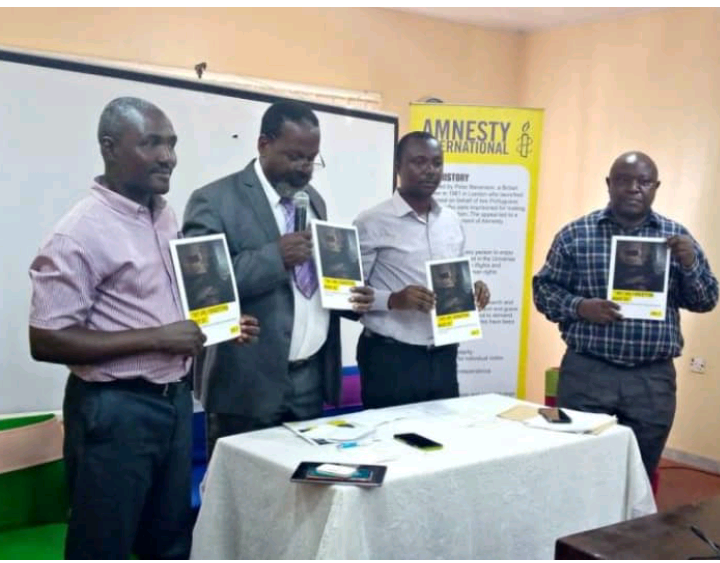
Amnesty International Launches Mental Health Report
Amnesty international Sierra Leone in partnership with Mental Health Coalition (MHC-SL) has on Tuesday 25th May 2021 launched a Mental Health report at Council of Churches in S/L ( CCSL) with the Title ” They are forgetting About Us”. This is a result of survivors of traumatic experiences and others in need of support in Sierra Leone that is being failed by the severe lack of available mental health services and the brutal civil war and devastating Ebola epidemic.
The organization was found in 1961 in which every person must enjoy all the right to Universal Deceleration of Human Rights and other International Human Right Standards.
Mr. Emmanuel Sattie, the National Coordinator of Human Rights Education, said Mental Health carried out thorough research on mental health and at the end of the operation; they were able to gather information. Mr. Sattie added that the idea behind the report is to encourage the government and donors to partner with them and to mobilize people so that they can be part of the drive to campaign for policy change that will benefit so many Sierra Leoneans including others who are struggling with mental health issues.
Solomon Moses Sogbandi, Executive Director, gave a brief background to the Mental Health Report, stating that “It is unfortunate that everybody including the government has not treated the issue of Mental Health with the seriousness it deserves”. He continued by recalling between November 2020 and May 2021, Amnesty International conducted and interviewed 55 people, including 25 Sierra Leoneans across five districts who were directly exposed to violence during the war or contracted the Ebola Virus.
Sogbandi added that mental health services in the country fall far short of meeting people’s needs, due to multiple significant barriers and these include a lack of government spending, insufficient donor support, shortage of skilled mental health professionals, and the few available services being concentrated primarily in cities.
He furthered that the Ebola survivors told Amnesty International of the immense psychological toll they experienced from the illness and its aftermath and are described been so sick that they did not know whether they would survive. They said the confusion, lack of information and overall poor government handling of the crisis at the time contributed to their distress.
He said poverty is an additional factor seriously affecting mental health, and many survivors said broken promises of social protection and reduced livelihood opportunities have further undermined their wellbeing, and that they felt abandoned by both the government and the international organizations that once provided aid.
Joshua Abioseh Doncan, Programmes Manager, Mental Health Coalition Secretariat, appreciated the efforts of Amnesty international as the issue of Mental Health is mostly been misunderstood from mental illness and this shows the limited knowledge that has around the issue that is evident around one out of every four individual in the world and of those not compared to the worse case around the country which has gone through lots of crisis.
Mr. Doncan continues, that they should be able to distinguish the Dynamics crisis and the multiple effects it has on people, as over the years Sierra Leone has been suffering from serious mental health situations before the rebel war and even the outbreak of Ebola.
Walter Carew, Chairman of Mental Health Coalition (MHC-SL), spoke about “The right to groom mental health is critical”, for which he noted that the report focuses on mainly two traumatic issues that occurred in the country of the civil war between March 1991, January 2002 and during the Ebola in 2014 gave a platform exposing the wickless of the country’s healthcare system in the country.
Carew added that there is a need for more attention to be put in releasing supplies for mental intervention throughout the country but are limited to the physical needs of the people. He appreciated the organization for such a great venture in ensuring to equip, educate stakeholders policymakers on what are the gaps and the impact on people after the disaster as this does not end in such circumstances.
Hassan Kamara, Spokesperson of the Ebola Virus Survivors shared his tragic moment during the Ebola Virus, as he lost all his family members during the era.
“Government does not respect war and Ebola victims,” he said and continued by calling on the government and other key stakeholders to pay attention to them as victims. He also called on the president to ensure that their funds are put into private use.
Fredrick. I. Kamara, Deputy Executive Secretary, Human Rights Commission of Sierra Leone, expressed thanks and appreciation to the two organizations for undertaking such a venture. He said that as a Commission they will continue to deal with the plight of war and Ebola victims are facing as citizens in the country.